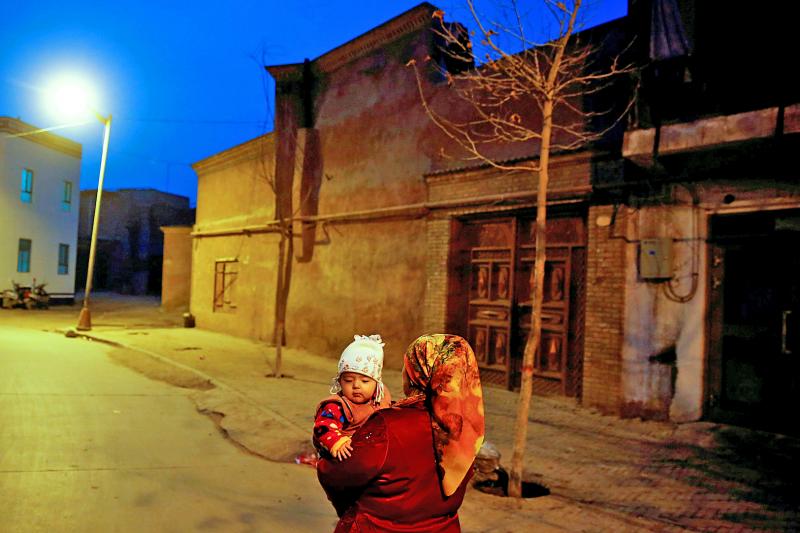Chinese policies aimed specifically at reducing the population of mainly Muslim Uighurs in Xinjiang could prevent the birth of about 4 million babies over the next two decades, new research has found.
Projections show reduced minority birthrates could raise the proportion of Han Chinese from 8.4 percent to 25 percent in southern Xinjiang.
Beijing has for years sought to tighten its grip on the vast border area historically marked by economic inequality and sporadic outbreaks of unrest.

Photo: Reuters
Millions of Han Chinese have relocated to Xinjiang to find work in the coal and gas-rich region in a settlement drive that has caused friction.
German researcher Adrian Zenz said publicly available papers by Chinese security researchers blamed the density of minority communities as the “underlying reason” for unrest and proposed population control as a risk-reduction method.
At the same time, documented official fears about the arid region’s lack of natural resources to support an influx of Han Chinese settlers suggest that the authorities see birth suppression as a key tool for manipulating the area’s demographic makeup, Zenz said.
China last week announced a major reform of policy governing the number of children a couple can have, increasing it to three as the nation grapples with an aging population, but academics say that Beijing does not view all babies as equally desirable in Xinjiang and is pursuing a policy of decreasing the number of children born to ethnic minorities.
Strategies include ramped-up birth control policies in the region — including imprisonment for having too many children and claims of forced sterilization.
Focusing on four prefectures in southern Xinjiang and using models recommended by multiple Chinese academics, Zenz calculated that Beijing could aim to raise the number of Han Chinese in the “traditional Uighur heartlands” to one-quarter of the population.
Zenz said that he found “an intent to reduce ethnic minority population growth in order to increase the proportionate Han population in southern Xinjiang.”
Official data show Xinjiang’s birthrate nearly halved between 2017 and 2019 — the steepest drop of all Chinese regions and the most extreme globally since 1950, an analysis by the Australian Strategic Policy Institute showed.
Zenz calculated the natural ethnic minority population growth in southern Xinjiang would have reached 13.14 million by 2040, but that suppression measures could prevent up to 4.5 million births among Uighurs and other ethnic minorities.
China has faced mounting international criticism over its policies in Xinjiang, where the US says Beijing is committing genocide.

The CIA has a message for Chinese government officials worried about their place in Chinese President Xi Jinping’s (習近平) government: Come work with us. The agency released two Mandarin-language videos on social media on Thursday inviting disgruntled officials to contact the CIA. The recruitment videos posted on YouTube and X racked up more than 5 million views combined in their first day. The outreach comes as CIA Director John Ratcliffe has vowed to boost the agency’s use of intelligence from human sources and its focus on China, which has recently targeted US officials with its own espionage operations. The videos are “aimed at

STEADFAST FRIEND: The bills encourage increased Taiwan-US engagement and address China’s distortion of UN Resolution 2758 to isolate Taiwan internationally The Presidential Office yesterday thanked the US House of Representatives for unanimously passing two Taiwan-related bills highlighting its solid support for Taiwan’s democracy and global participation, and for deepening bilateral relations. One of the bills, the Taiwan Assurance Implementation Act, requires the US Department of State to periodically review its guidelines for engagement with Taiwan, and report to the US Congress on the guidelines and plans to lift self-imposed limitations on US-Taiwan engagement. The other bill is the Taiwan International Solidarity Act, which clarifies that UN Resolution 2758 does not address the issue of the representation of Taiwan or its people in

DEFENDING DEMOCRACY: Taiwan shares the same values as those that fought in WWII, and nations must unite to halt the expansion of a new authoritarian bloc, Lai said The government yesterday held a commemoration ceremony for Victory in Europe (V-E) Day, joining the rest of the world for the first time to mark the anniversary of the end of World War II in Europe. Taiwan honoring V-E Day signifies “our growing connections with the international community,” President William Lai (賴清德) said at a reception in Taipei on the 80th anniversary of V-E Day. One of the major lessons of World War II is that “authoritarianism and aggression lead only to slaughter, tragedy and greater inequality,” Lai said. Even more importantly, the war also taught people that “those who cherish peace cannot

US Indo-Pacific Commander Admiral Samuel Paparo on Friday expressed concern over the rate at which China is diversifying its military exercises, the Financial Times (FT) reported on Saturday. “The rates of change on the depth and breadth of their exercises is the one non-linear effect that I’ve seen in the last year that wakes me up at night or keeps me up at night,” Paparo was quoted by FT as saying while attending the annual Sedona Forum at the McCain Institute in Arizona. Paparo also expressed concern over the speed with which China was expanding its military. While the US